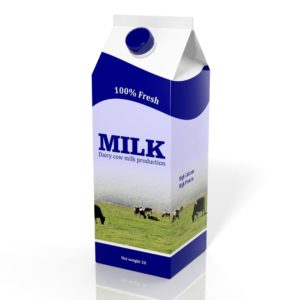December 13, 2018 | Black & Kletz Allergy

Immediate hypersensitivity reactions (Type I allergy reactions) to cow’s milk are mediated by an antibody (i.e., Immunoglobulin E or IgE) to the protein in milk.
Symptoms:
The symptoms of milk allergy usually appear within minutes of ingestion and may involve multiple body systems. Below are some common symptoms that may be associated with cow’s milk allergy:
Skin: Itching, redness, hives, swelling
Respiratory:
Upper: Nasal congestion, runny nose, sneezing, hoarseness
Lower: Coughing, wheezing, chest tightness, shortness of breath
Eyes: Redness, itching, puffiness of eyelids
Heart: Pallor, fainting, dizziness
Gastrointestinal: Abdominal pain and/or cramping, vomiting, diarrhea
Diagnosis:
- Skin prick testing
- Cow’s milk specific serum IgE via blood testing
- Oral food challenge
A double-blind oral challenge with food under controlled conditions under medical supervision is considered the gold standard in the diagnosis of food allergies. It may not be needed however when the clinical presentation is highly suggestive of the diagnosis and when it is supported by appropriate test results.
Treatment:
Currently, the only FDA-approved treatment for cow’s milk allergy is strict avoidance of all exposure to cow’s milk protein. It is also very important to have an emergency treatment plan in case of an accidental ingestion and/or exposure.
Cow’s milk proteins are found in all dairy products including milk, cheese, yogurt, butter, ice cream, and pudding. Other foods such as breads, cookies, crackers, and cakes may also contain milk products. In packaged foods, milk may be listed as a major ingredient or in the “may contain” list. Sometimes, a product will convey that the food was made in the same facility as other foods that contain milk. Parents also must be aware of the possibility of cross contamination of milk with other foods, especially in restaurants. Other products that contain casein, whey, hydrolysates, lactose, lactulose, lactoglobulin, lactoferrin, lactalbumin, ghee, rennet, artificial butter flavor, artificial cheese flavor, and/or curd should also be avoided. It is also a good idea for parents of a child with cow’s milk allergy to share his or her allergy with caregivers, teachers, principals, school nurses, neighbors, relatives, and parents of the child’s friends so that they are all aware of the allergy and what to do if the child comes in contact with cow’s milk.
Some children with cow’s milk allergy may be able to tolerate baked milk foods as prolonged heating at high temperatures can denature the protein making it less allergenic. However children with established cow’s milk allergy should be fed baked milk foods only if they pass the oral challenge with baked food under medical supervision. It is best and recommended, however, to avoid baked milk foods just to be on the safe side.
Medications:
Self-injectable epinephrine devices (e.g., EpiPen, Auvi-Q, Adrenaclick) should be readily available to treat a severe reaction after accidental exposures. Milder reactions may be treated with antihistamines such as Benadryl (i.e., diphenhydramine).
Resolution:
As mentioned before, an oral food challenge is the gold standard to establish if the allergy has been “outgrown,” however, in some cases, this may not be feasible to do in a doctor’s office. The board certified allergist may repeat food allergy tests may every year to determine whether it is safe to perform oral food challenges.
Cow’s milk is a very important source of nutrition in infants and young children, as it contains carbohydrates, fats, protein, and various essential minerals and vitamins. When milk is being avoided, children should be fed proper nutritional substitutes in adequate quantities and parents may need guidance from a certified dietician to choose the alternative foods.
The board certified allergists at Black & Kletz Allergy have 3 convenient locations with on-site parking located in Washington, DC, McLean, VA (Tysons Corner, VA), and Manassas, VA. The Washington, DC and McLean, VA offices are Metro accessible and we offer a free shuttle that runs between the McLean, VA office and the Spring Hill metro station on the silver line. The allergy specialists at Black & Kletz Allergy are extremely knowledgeable regarding cow’s milk allergies as well as other food allergies. We diagnose and treat both pediatric and adult patients. In addition, we treat patients with environmental, medication, insect sting, and skin allergies, asthma, sinus disease, and immunological disorders. To schedule an appointment, please call any of our offices or you may click Request an Appointment and we will respond within 24 hours by the next business day. We have been servicing the greater Washington, DC area for more than 50 years and we look forward to providing you with excellent state of the art allergy care in a friendly and professional environment.












